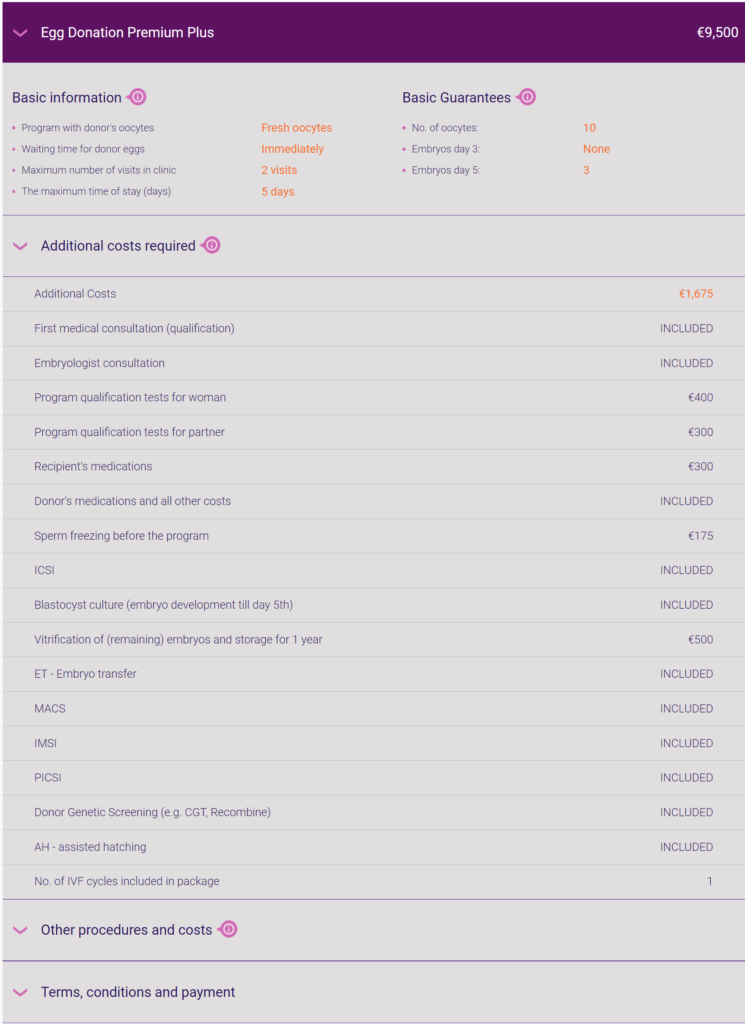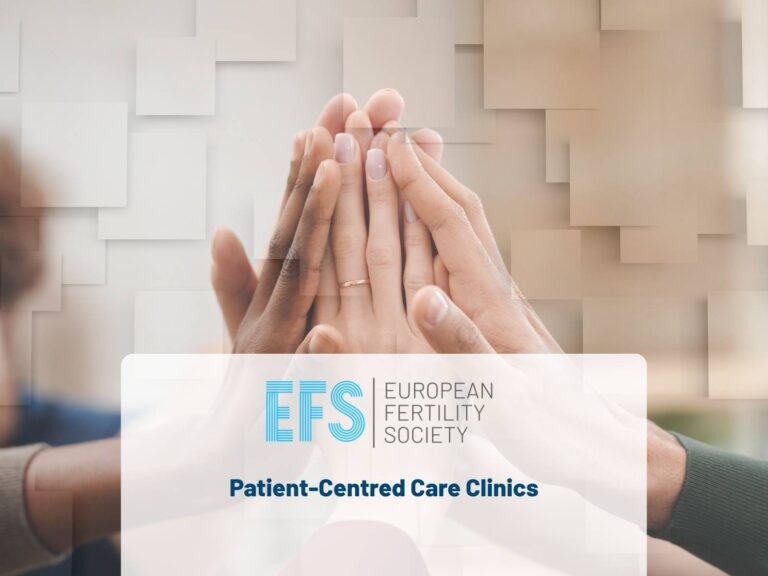Latest Update: January 28, 2026
IVF with donor eggs (egg donation) is one of the most effective fertility treatments available today. It involves fertilising eggs from a donor with sperm from a partner or donor, then transferring resulting embryos into the recipient’s uterus. Egg donation is especially recommended for women who cannot conceive with their own eggs due to age, health, or genetic reasons.
Egg Donation IVF Explained – Summary
- What it is: IVF using donor eggs, fertilised with sperm, then transferred to recipient.
- Why it’s popular: Wide donor availability, higher success rates, and lower costs abroad.
- Costs: Range €5,000–€15,000 depending on country, clinic, and add-ons.
- Success rates: Average ~50% live birth rate with donor eggs vs ~2% at age 45 with own eggs.
- Donor anonymity: Varies by country (anonymous in Spain/Greece; non-anonymous in the UK/Portugal/Denmark).
What is Egg Donation IVF?
Egg donation IVF is a form of IVF where:
- Eggs are donated by a donor.
- Those eggs are fertilised with sperm (partner or donor).
- The resulting embryo(s) are transferred into the recipient’s uterus.
It’s one of the most sought-after procedures for patients who cannot conceive using their own eggs, and a major reason why patients travel abroad for fertility care.
Why Patients Choose Egg Donation IVF Abroad
- Donor availability: Wider pools, with little to no waiting lists.
- Affordability: Lower treatment costs compared to the UK or USA.
- Legal flexibility: Choice between anonymous or non-anonymous donors depending on the country.
- Treatment quality: Advanced labs, modern techniques, and donor diversity abroad.
Egg Donation Treatment – Key Considerations
- Donor requirements: Young women under 35, healthy, no genetic or infectious conditions.
- Anonymity rules:
- Non-anonymous donors: UK, Portugal, Denmark (recipient and child may learn donor details).
- Anonymous donors: Spain, Greece and Czech Republic.
- Enhanced matching: Some clinics offer phenotype matching and facial recognition tools for better resemblance.
- Recruitment challenges: Despite favorable laws, donor shortages occur in some countries (e.g., UK).
The Egg Donation Process
- Donor stimulation: Hormonal injections induce ovulation for multiple eggs.
- Egg retrieval: Collected under sedation.
- Fertilisation: Donor eggs fertilised with sperm (partner or donor).
- Embryo transfer: Fresh or frozen embryos placed in recipient’s uterus.
- Variables: Embryo viability, implantation success, and pregnancy progression.
Fresh vs Frozen Cycles
- Fresh cycle: Donor and recipient cycles synchronised with medication.
- Frozen cycle: Eggs/embryos vitrified and stored for future use.
IVF Add-Ons Used in Donor Cycles
- Donor genetic screening (CGT, Recombine).
- ICSI, blastocyst culture (standard in many clinics).
- IMSI, MACS for male factor infertility.
- Embryo monitoring.
- Assisted hatching (AH).
- EmbryoGlue.
Egg Donation Costs Abroad
- Typical range: €5,000–€15,000 depending on country and package.
- Factors impacting cost: Donor cycle type (fresh/frozen), add-ons, storage, genetic testing, or cancelled cycles.
- Spain example: €9,500 base program + €1,675 extra (medications, sperm freezing, storage).
Below you will find the cost example of an egg donation program/package at one of the IVF clinics in Spain -the overall cost is 9,500 with plenty of additional options included, however, there is an additional cost of around 1,675 which covers program qualifications, recipient’s medications, sperm freezing and vitrification and storage of surplus embryos. It’s just one of the “IVF, egg donation package” examples.

What to Ask the Clinics
- What’s included in the package? (Donor costs, medications, freezing).
- Refund/guarantee programs available? (Money-back if no success after 3 cycles).
- Policies for failed donor cycles or absence of embryos.
Egg Donation Success Rates
- Average: ~50% live birth rate per cycle.
- Comparison: At age 45, own eggs yield only ~2% live birth rate.
- Why higher: Donor eggs are from young, healthy women, improving embryo viability.
- Improvement with multiple cycles: Higher cumulative success.
No IVF procedure is 100% guaranteed but any which uses eggs (or sperm) from a donor will usually result in a higher success rate which is due to the quality and viability of the donated gamete. Various IVF clinics offer IVF refund program which may guarantee the refund based on the expected outcome of the IVF treatment. Such packages are often called “IVF money-back guarantee” or “IVF guarantee”. IVF refund packages are expensive however usually there are 3 IVF cycles with donor eggs included in such a program.
If we consider patients of all ages there is an average donor egg success rate of 50% although this figure will go up or down depending on a number of factors including the patient’s health, the quality of the donated egg and resulting embryo or the expertise of the treatment provider. The success rates result above is a live birth – based on data from international assisted reproduction associations – ASRM, ESHRE, SART.
Compared to an IVF treatment when a woman provides her own eggs, IVF with donor eggs are on average more successful. This is particularly the case with older patients. Success rates for treatments involving the patients own eggs are obviously affected by different physical and genetic factors and these can be more impactful as we age.
Egg quality will naturally decline over time until a woman experiences menopause; quality will usually worsen after the age of 35. Using the eggs of a younger woman negates the importance of the patient somewhat and drastically improves the chances of success.
It is estimated that at the age of 45 the chances of a woman achieving a live birth from IVF using her own eggs is just 2%. Using a younger donor increases this percentage to the 50% figure and this figure can be increased yet again if multiple cycles are undertaken.
IVF with donor eggs is a tried and tested procedure which has offered hope to women who would have previously been denied the opportunity to become a mother.
It offers higher success rates than IVF using a patient’s own eggs and is an option available in most countries.
Finding Egg Donors
- Clinic matching: Most recipients matched by phenotype (physical traits).
- Egg banks: Sometimes allow browsing, but anonymity laws limit access in Europe.
- Expectation: Donors are carefully screened, under 35, and medically cleared.
Egg Donation Abroad – Patient Journey
Women often travel abroad for donor egg IVF because of better donor availability, shorter waiting times, and lower costs. For many, it involves:
- Initial consultation: Medical history review and treatment planning.
- Donor selection: Depending on country, either anonymous or non-anonymous.
- Treatment abroad: Two to three visits for retrieval, fertilisation, and transfer.
- Aftercare: Monitoring pregnancy success and arranging storage for surplus embryos.
Why Egg Donation IVF is Popular
- Provides hope for women otherwise unable to conceive.
- Offers higher success than IVF with own eggs.
- Widely available worldwide.
- Flexible legal and donor options depending on destination.
What is egg donation IVF?
IVF where donor eggs are fertilised and transferred into the recipient’s uterus.
Are donors anonymous?
Depends on the country: anonymous in Spain/Greece, non-anonymous in the UK/Portugal/Denmark.
How much does egg donation cost abroad?
Packages typically range €5,000–€15,000 depending on country and inclusions.
Why travel abroad for egg donation?
To access wider donor pools, lower costs, and more flexible legal conditions.




